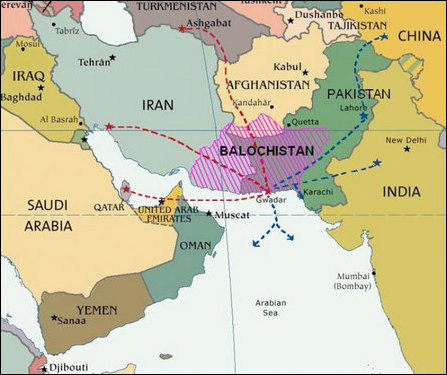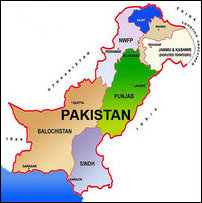US Congress tables resolution on Baloch self-determination
[TamilNet, Monday, 20 February 2012, 17:08 GMT]A resolution has been introduced in the US Congress last week, calling upon Pakistan to recognize the right to self-determination of the Baloch people, whose main territory Balochistan, bordering Iran in the west and Afghanistan in the north, is currently a province in Pakistan. It is the US policy to “oppose aggression and the violation of human rights inherent in the subjugation of national groups as currently being shown in Iran and Pakistan against the aspirations of the Baloch people,” the motion said. The resolution also talks on the distribution of the Baloch in Pakistan, Iran and Afghanistan, their long revolts since 1958 and the need for the world to give them an opportunity to choose their own status among the community of nations. Balochistan is rich in oil and minerals with pipeline access to sea besides its strategic importance to US engagements in West Asia and Afghanistan.
The revolts in Baloachistan, in 1958, 1973 and 2005 “indicate continued popular discontent against Islamabad’s rule, and the plunder of its vast natural wealth while the province remains the poorest in the country,” the motion in the US Congress said.
“The Baloch, like other nations of people, have an innate right to self-determination. The political and ethnic discrimination they suffer is tragic and made more so because America is financing and selling arms to their oppressors in Islamabad,” the motion further said.
The resolution was tabled by the US Congressman Dana Rohrabacer, who a few days ago chaired a Congressional hearing on Balochistan.
Meanwhile, there were strong reactions in Pakistan.
On Monday Pakistan foreign ministry summoned the acting US envoy Richard Hoagland to lodge a strong protest.
Hoagland was "told in clear terms that the move in the US Congress was contrary to the spirit of friendly relations and violative of the principles of the United Nations Charter, international law and recognized norms of inter-state conduct", the statement said.
Pakistan’s parliament earlier passed a resolution condemning the hearings of the US Foreign Affairs Sub-Committee.
The provincial assembly of Pakistan’s Punjab, adjacent to Baloachistan, condemned the US bill and wanted the US ambassador to be summoned to its house for an explanation.
Questioning the US silence over the Kashmir issue in contrast, the Pakistan-Punjab assembly also wanted the federal government in Islamabad to take up the Kashmir issue more effectively and to convince to US congress to raise its voice against Indian brutality in the Kashmir valley.
However, many in Pakistan believe that the US Congress bill is not the view of the US Administration and is only a pressure tactic.
But political observers think that the USA and India are likely to take a common stand on Balochistan.

The map shows the demography of Baloch nation in the province of Balochistan now in Pakistan, as well as in Iran and Afghanistan. The map also shows the communication potentialities of the country with China, Central Asia, West Asia and with the Arabian Sea. Instead of the Karakoram route to China, shown in the map, China on its own now works on a shorter route through Quetta to Karakoram.
China at the moment builds a deep-water harbour, similar to Hambantota in Sri Lanka, at Gwadar in Balochistan, and is also engaged in building a highway linking the harbour with Balochistan’s capital Quetta close to Afghan border, eventually to link the harbour with China, through the Karakoram Pass of the Himalayas.
China has also invested in oil and minerals in Balochistan.
Apart from oil and gas, Balochistan is rich in gold, copper, zinc and coal.
China’s control of the corridor through Balochistan can "bind India down in South Asia, restricting its capacity to operate elsewhere," a Forbes feature in May 2010 said. In its ventures in Balochistan, China is wiling to play in the bribery culture traditional to the area, the article further said.
Meanwhile, last week, Sri Lanka’s Rajapaksa wanted to assert to his newly found international status as ‘expert’ in handling national questions through military and genocide. The SL president visiting Islamabad had secret talks on providing military expertise to Pakistan in the subjugation of Balochistan, political circles of the Baloch accused.
Rajapaksa’s secret deal with Pakistan sabotages India’s designs in Balochistan, commented a South Asian diplomat.
The International Crisis Group (ICG) sometimes back pointed out the discrepancy in the outlook of the international community regarding national questions: favouring some of them, not favouring some others and watching the rest.
The US Congress and especially the State Department are answerable for their discrimination in recognising neither the genocide committed on Eezham Tamils nor their right to self-determination, Eezham Tamil circles pointed out.
The Tamil Nadu State Assembly, confining only to the war crimes, was not strong enough in defending the national cause of Eezham Tamils, compared to the boldness of Pakistan-Punjab provincial assembly in dealing with foreign affairs of its interest, commented political observers in Chennai.
The Dravidian-speaking Brahui people, having prehistoric relations to Tamils in language and numbering around three million today, are mainly natives of Balochistan. They also are found in the neighbouring Iran and Afghanistan, as part of the Baloch identity.
Related Articles:
13.02.12 Pakistan seeks Colombo’s help in deploying genocidal model
25.03.11 Democratic uprising in Tamil Nadu crucial to changes in the ..
25.08.06 Pakistan ‘guiding’ Sri Lanka’s war
External Links:
| balochwarna.com: | US Congressman tables resolution calling for independence of Baloch |


கருத்துகள் இல்லை:
கருத்துரையிடுக